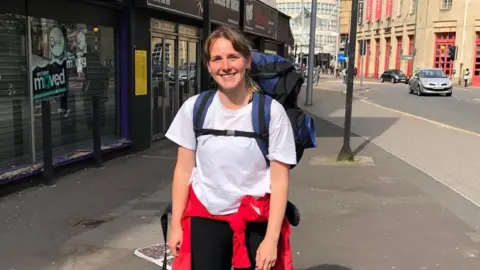 Chloe Davies
Chloe DaviesA woman whose body does not recognise when to stop swelling says a drug trial has been “life-changing”.
Chloe Davies, 32, who lives in Bristol, has hereditary angioedema (HAE), which causes “spontaneous swelling attacks”.
“If my hand swelled up it would just keep going and going. Severe attacks can leave me hospitalised and are extremely disruptive to everyday life,” she said.
She has been taking part in the trial with North Bristol NHS Trust, which has reduced her attacks from one every four to six days to none in more than a year.
The condition, which affects around one in 50,000 people, can be life-threatening if swelling happens in the throat.
There is no cure, but treatment can be given to help patients manage their condition.
Ms Davies first began experiencing symptoms as a child, but did not receive a diagnosis until she was 15.
Initially, it was thought she was experiencing an allergic reaction.
She remembers experiencing flare-ups where her hands “tripled in size” and the swelling would gradually spread higher up her arm.
‘Validating’ diagnosis
During her childhood, she regularly suffered with “bad” stomach aches and sickness bugs, which would last longer than usual.
“I remember lying on the sofa being in quite severe pain, but not realising it [was HAE] at that point.
“No one can see what’s going on internally so they just assumed that I was making a bigger fuss than everyone else,” she said.
She added that receiving a diagnosis after years of suffering had been “very validating”.
There are different types of angioedema, which vary in severity.
According to the NHS, the condition causes sudden swelling and commonly affects the face, hands and feet.
Sometimes the bowel can become swollen, leading to stomach pain.
 Chloe Davies
Chloe DaviesMs Davies’ HAE symptoms became “much worse” after having her daughter nine years ago.
Her monthly flare-ups began occurring every four days, which “dramatically” impacted her life.
Every attack required treatment via an intravenous injection.
“It gave me what I needed to be able to bounce back, but it’s never nice giving yourself an injection,” she said.
She added the treatment had been “tricky”, particularly when having to administer it while on the go.
‘Immediate difference’
Eighteen months ago, Ms Davies’ consultant – who specialises in HAE – suggested trialling a new medication at Southmead Hospital.
It involves an injection into the subcutaneous fat under the skin to deliver a drug into the bloodstream.
The drug works to lower the amount of a protein produced by the liver that causes the swelling.
Ms Davies was given the real drug, rather than a placebo.
She noticed an “immediate” difference and has only experienced one flare-up since starting the treatment.
“It’s amazing – it’s changed my life,” she said.
“It’s helped provide a space to do what I want without worrying.
“I feel genuinely very cared for and the research team at North Bristol NHS Trust has been really great.”
She added: “It’s changed my opinion of doing a trial.”

